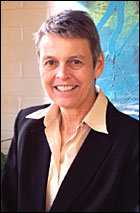Next: Changing the world, one chair at a time
Posted Jan. 12/08
 The Faculty of Public Affairs is made up of diverse departments and schools unified by a commitment to address organizations, policy and interactions among the sectors of civic society. Throughout the Faculty, key themes emerge in our teaching and research: policy relevance and innovation, community engagement, international leadership and communication excellence.
The Faculty of Public Affairs is made up of diverse departments and schools unified by a commitment to address organizations, policy and interactions among the sectors of civic society. Throughout the Faculty, key themes emerge in our teaching and research: policy relevance and innovation, community engagement, international leadership and communication excellence.
This issue of Panorama used these themes as a starting point but, of course, they aren’t discrete categories. Multifaceted and interdisciplinary, the work of faculty members and students is as rich and complex as the issues they study.
One of the great strengths of the Faculty is our ability to translate what we do in academia to the world around us, and to prepare students to take on the challenges and opportunities of working with and in business, government and non-profit sectors. Our faculty, students and alumni contribute to the liveability, sustainability and fairness of the community. Just how much we interact with the community—and it is a lot—is now being documented.
Ted Jackson, associate dean of research and graduate affairs, chairs the university-wide Carleton Initiative for Community-University Engagement, which is documenting the courses, projects and activities undertaken at Carleton that contribute to community life. From experiential learning and co-op placements, to community-based research, to fundraising activities, the initiative’s goal is to log the activity between the university and the community—be it the non-profit sector, government departments or private sector.
By underscoring the importance of the relationship between Carleton and the community, the initiative will allow faculties to explore collaborative and effective opportunities in teaching and research. One such activity, a local community-based research project, is highlighted here.
But community isn’t limited to Ottawa. Internationally, the School of Public Policy and Administration continues to build its reputation in program evaluation, working with UNICEF to deliver programs in South Asia (see here). This example of international leadership is echoed here in other stories of Russia, Washington, Africa and Iraq.
Perhaps our four themes are best illustrated in the story of two generous donors who made gifts to the Norman Paterson School of International Affairs and the Department of Political Science. William Barton made the third-largest individual donation in Carleton’s history to create an endowment fund to support arms control and disarmament studies, and alumna Ruth Bell established the Honorable Dick and Ruth Bell Chair for the Study of Canadian Parliamentary Democracy. Their generosity reinforces areas of excellence in the Faculty and will create new opportunities for scholarship. By engaging the community through lectures, focusing research on policy relevance and innovation, providing international leadership in the areas of study and communicating it all, these Chairs will ensure the Faculty of Public Affairs remains a leader in these important fields.
Katherine Graham
Dean, Faculty of Public Affairs